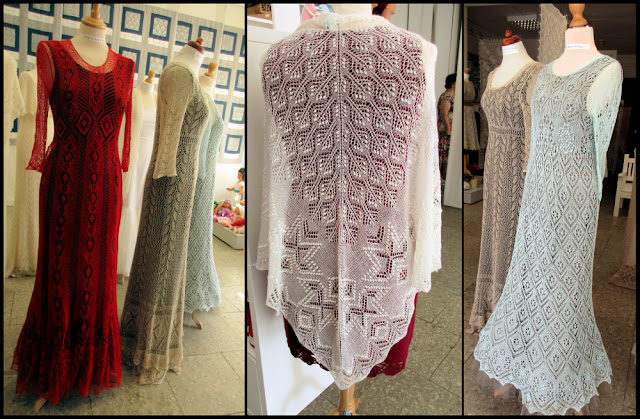(Warning: this post has LOTS of photographs!)
 |
| One of Conny's shawls©ConnyWolthuis |
Wool and Woolen, the yarn shop in Tallinn which I mentioned in my last blog post, is only one block from the bus station, so you know that was our first stop. Eve was not in, but her assistant, Erika enthusiastically gave me a few rows of a lace border stitch.
And then, we boarded a bus to Haapsalu. This was a pilgrimage of sorts. Haapsalu is famous for its special style of knitted shawls. In the 1800s, Russian aristocrats came to Estonia’s resorts to take a summer holiday and enjoy the curative powers of the Baltic sea mud. This was a great opportunity for the local women to sell their handcrafted items. In Haapsalu, the Russian women particularly liked the fine lace shawls which became a favorite souvenir.
One technique that is indicative of a Haapsalu shawl is the use of “nuups,” a special type of bobble, that provide more texture and interest to the shawls and scarves. Nuup means “bud” in Estonian. As you can see from these examples, they are used in unlimited creative patterns. It is not unusual for a shawl to have well over 1000 nuups.

The shawl knitters were paid by the weight of the shawls and they discovered that the nuups made the shawls heavier. About the middle of the 20th century, machine knitting came into play and factories were cranking out Haapsalu shawls that they could sell much cheaper. This would have doomed the handmade shawls, except for the fact that the machines could never duplicate the tell-tale nuups! The craft was saved. Buyers could be guaranteed of a handcrafted shawl when the nuups were present. Now, virtually all Haapsalu shawls, scarves, and dresses contain a nice collection of nuups. Isn’t that a great happy ending?
 We settled ourselves in the Old Town Hostel, which was really a small inn, and quite comfortable. The next day was Tuesday and we had to wait until 11:00 when the Lace Center opened, so Conny and Cathy sat in the park across the street and knit!
We settled ourselves in the Old Town Hostel, which was really a small inn, and quite comfortable. The next day was Tuesday and we had to wait until 11:00 when the Lace Center opened, so Conny and Cathy sat in the park across the street and knit!Finally…11:00 came and we walked the short way over to the Lace Center were we received a very warm welcome!
Conny was excited because just a few days before we arrived, King Willem from the Netherlands was in Estonia and received this lace shawl for his wife, Queen Maxima.
It was designed especially for her and is named the “Dutch Queen Maxima Shawl.” Helin Pōldve is the designer and she developed a special kind of 3-petaled nuup for it to symbolize Dutch tulips. Conny told the receptionist that she would like to meet the designer and before we could blink twice, Helin had been called and she showed up at the Center to visit with us!
 |
| Helin discusses her design process with Conny. |
Helin demonstrated how to make the special tulip nuups when she added some Estonian lace to me!!! Can you believe THAT! I will be famous!
 |
| Helin points out the tulip nuups at the top of her lace band. |
 |
| Helin, Cathy, and Conny talking about lace and designing. |
Helin had given up her lunch hour to come over and visit with us. When Cathy and Conny found that out, they apologized for taking up her time on a work day. She dismissed that, saying, “I’m not spending my knitting time eating!”
I instantly fell in love with her!
In the shop and museum, Cathy got lots of photos of the most exquisite lace you have ever seen.
It was Tuesday, which is the day when local women come in to knit together. We had not planned our trip that way, but we sure were lucky!
 |
| Tuesday Knitting Group at the Haapsalu Lace Center |
 |
| Linda Elgas |
She quickly and skillfully knitted up a quick stitch called mustika muster in Estonian, which means “blueberry stitch.” Before she left for the day, Linda purchased a KILO of lace-weight yarn! A KILO! Do you know how many shawls that will make—probably 10 or 12! It is an honor to have been held in her skilled hands.
I was then passed around to so many talented knitters that life became a blur. Ulle and her daughter Kristel often drive down from Tallinn just to enjoy the Tuesday knitting group. They were followed by Katrin who created a multi-colored vits (twig) stitch, and Mirjam.
 |
| Left to right: Ulle Kristel, Katrin, and Mirjam |
Conny and Cathy just had to do a little shopping. Conny purchased some yarn and patterns and this wonderful shawl:

Cathy purchased some fine laceweight merino—enough to make a shawl. The shop also had collections of cards, each with a photo of a traditional Haapsalu motif on it along with the charted pattern on the back.

Showing the women photos of her work on her phone, Conny discusses her shawl designs:

It was a full, full day!
We spent seven hours at the Haapsalu Lace Center and walked out as they closed for the day. Conny and Cathy were exhausted but so excited. For them, it was like spending the day with famous celebrities. And indeed, these talented women are certainly celebrities in the knitting world.
The next day, we were featured in this post on the Haapsalu Lace Center Facebook page.
Our next stop on Wednesday would be Parnu, so Conny could meet lace designer Cassie Rosse.






No comments:
Post a Comment